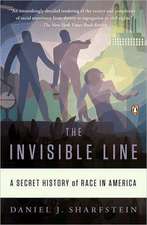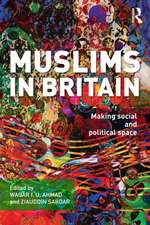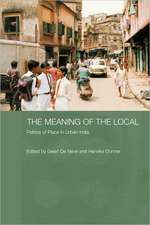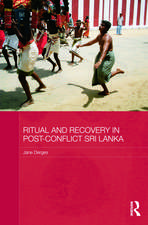Racial Theories in Social Science: A Systemic Racism Critique: New Critical Viewpoints on Society
Autor Sean Elias, Joe R. Feaginen Limba Engleză Paperback – 14 apr 2016
| Toate formatele și edițiile | Preț | Express |
|---|---|---|
| Paperback (1) | 347.91 lei 6-8 săpt. | |
| Taylor & Francis – 14 apr 2016 | 347.91 lei 6-8 săpt. | |
| Hardback (1) | 1330.16 lei 6-8 săpt. | |
| Taylor & Francis – 12 apr 2016 | 1330.16 lei 6-8 săpt. |
Din seria New Critical Viewpoints on Society
-
 Preț: 325.02 lei
Preț: 325.02 lei -
 Preț: 287.41 lei
Preț: 287.41 lei -
 Preț: 340.98 lei
Preț: 340.98 lei -
 Preț: 343.83 lei
Preț: 343.83 lei -
 Preț: 341.16 lei
Preț: 341.16 lei -
 Preț: 284.78 lei
Preț: 284.78 lei - 30%
 Preț: 1014.74 lei
Preț: 1014.74 lei -
 Preț: 304.26 lei
Preț: 304.26 lei -
 Preț: 340.17 lei
Preț: 340.17 lei -
 Preț: 352.59 lei
Preț: 352.59 lei -
 Preț: 341.74 lei
Preț: 341.74 lei -
 Preț: 385.54 lei
Preț: 385.54 lei - 16%
 Preț: 241.30 lei
Preț: 241.30 lei -
 Preț: 384.86 lei
Preț: 384.86 lei -
 Preț: 328.95 lei
Preț: 328.95 lei -
 Preț: 356.45 lei
Preț: 356.45 lei -
 Preț: 348.77 lei
Preț: 348.77 lei -
 Preț: 377.84 lei
Preț: 377.84 lei -
 Preț: 356.75 lei
Preț: 356.75 lei -
 Preț: 389.96 lei
Preț: 389.96 lei -
 Preț: 388.13 lei
Preț: 388.13 lei -
 Preț: 349.80 lei
Preț: 349.80 lei -
 Preț: 435.77 lei
Preț: 435.77 lei - 25%
 Preț: 994.58 lei
Preț: 994.58 lei -
 Preț: 369.73 lei
Preț: 369.73 lei -
 Preț: 323.23 lei
Preț: 323.23 lei -
 Preț: 377.84 lei
Preț: 377.84 lei
Preț: 347.91 lei
Nou
Puncte Express: 522
Preț estimativ în valută:
66.57€ • 69.37$ • 55.12£
66.57€ • 69.37$ • 55.12£
Carte tipărită la comandă
Livrare economică 03-17 aprilie
Preluare comenzi: 021 569.72.76
Specificații
ISBN-13: 9781138645226
ISBN-10: 1138645222
Pagini: 308
Dimensiuni: 152 x 229 x 20 mm
Greutate: 0.41 kg
Ediția:1
Editura: Taylor & Francis
Colecția Routledge
Seria New Critical Viewpoints on Society
Locul publicării:Oxford, United Kingdom
ISBN-10: 1138645222
Pagini: 308
Dimensiuni: 152 x 229 x 20 mm
Greutate: 0.41 kg
Ediția:1
Editura: Taylor & Francis
Colecția Routledge
Seria New Critical Viewpoints on Society
Locul publicării:Oxford, United Kingdom
Public țintă
Postgraduate and UndergraduateCuprins
Introduction
Post-Racial America and Social Science: Reality or Myth?
PART I-Social Sciences’ Historic Misframing of "Race"
1) The Twin Births of Social Science and Race Theory
2) Race Theory and the Rise of Mainstream Social Science
PART II-Contemporary Mainstream Social Science and Race Theory
3) Changes in the Field of Race Studies
4) Subverting Racial Analysis: Emphasizing Practice, Groupness, Boundaries, and Reflexivity
5) Class, Culture, Ethnicity, and Nationality, Anything but "Race"
6) Race and the Genome: Biosocial Theories of Race
7) Assimilation Theory’s Dominion in Social Science
8) A Systemic Racism Critique of Racial Formation Theory
PART III-Systemic Racism Theory-Background and Overview
9) Critical Black Theory: Foundations of Systemic Racism Theory
10) Systemic Racism Theory
Conclusion: Persisting Systemic Racism, The Empirical Reality
Post-Racial America and Social Science: Reality or Myth?
PART I-Social Sciences’ Historic Misframing of "Race"
1) The Twin Births of Social Science and Race Theory
2) Race Theory and the Rise of Mainstream Social Science
PART II-Contemporary Mainstream Social Science and Race Theory
3) Changes in the Field of Race Studies
4) Subverting Racial Analysis: Emphasizing Practice, Groupness, Boundaries, and Reflexivity
5) Class, Culture, Ethnicity, and Nationality, Anything but "Race"
6) Race and the Genome: Biosocial Theories of Race
7) Assimilation Theory’s Dominion in Social Science
8) A Systemic Racism Critique of Racial Formation Theory
PART III-Systemic Racism Theory-Background and Overview
9) Critical Black Theory: Foundations of Systemic Racism Theory
10) Systemic Racism Theory
Conclusion: Persisting Systemic Racism, The Empirical Reality
Notă biografică
Sean Elias studies racial group divisions and epistemological color lines in social science, black cultural-intellectual traditions, particularly black social thought and Louisiana Creole culture, and perspectives and practices of elites. He has taught at Prairie View A&M University (an HBCU) and Southern Methodist University (an HWCU) and now teaches at Colorado Mountain College while completing fieldwork on the Aspen elite.
Joe Feagin, Ella McFadden Professor at Texas A&M University, has done decades of research on racism and sexism issues. Among his major books are Systemic Racism (Routledge 2006); The White Racial Frame (2nd edn; Routledge 2013); Racist America (3rd edn; Routledge 2014); Latinos Facing Racism (Paradigm 2014, with José Cobas); and The Myth of the Model Minority (2nd edn., Paradigm, 2015, with Rosalind Chou). He is the recipient of the American Sociological Association’s Du Bois Career of Distinguished Scholarship Award and was the 1999-2000 President of the American Sociological Association.
Joe Feagin, Ella McFadden Professor at Texas A&M University, has done decades of research on racism and sexism issues. Among his major books are Systemic Racism (Routledge 2006); The White Racial Frame (2nd edn; Routledge 2013); Racist America (3rd edn; Routledge 2014); Latinos Facing Racism (Paradigm 2014, with José Cobas); and The Myth of the Model Minority (2nd edn., Paradigm, 2015, with Rosalind Chou). He is the recipient of the American Sociological Association’s Du Bois Career of Distinguished Scholarship Award and was the 1999-2000 President of the American Sociological Association.
Recenzii
Racial Theories in Social Science is a groundbreaking book. Not only does it offer an exhaustive analysis of how the social sciences have aided and abetted systemic racism, but it provides, as well, a stirring paradigm shift that places race at the heart of the social scientific enterprise. This book brilliantly engages every major theory of race in both its historical context, and its analytical framework, to address the shortcomings and potential of each theory to explain the racial crises at hand. Joe Feagin is a legend in the field, and his deserved reputation for bold and provocative thought is on generous display in his superb collaboration with Sean Elias. This book is both a comprehensive roadmap to the broad and varied field of social scientific thought, and a scholarly inquiry into the constitution and construction of racial theory in the service of understanding and explaining how institutions and individuals behave. This is a scholarly tour de force that is a must read for all who are interested in social thought and race, and a book that will be eminently useful for years to come.
Michael Eric Dyson, Professor of Sociology, Georgetown University
Elias and Feagin's Racial Theories in Social Science provides a critical, and much needed examination of how social science has systematically been racialized and thus compromised even in its attempt to shed light on racial structures in the U.S. Their examination, covering the entire spectrum of what goes for racial theories, demonstrates a discipline that is itself problematized by the very structures that it attempts to analyze. So rather than being an unbiased, critically reflective enterprise the racial project becomes embedded in the very science that purports to examine it. This is a must read as it will undoubtedly redefine and re-situate racial theories in the social sciences.
Rodney Coates, Director of Black World Studies, Miami University
Racial Theories in Social Science pulls together critical assessments of major trends and themes in the history of sociology’s investigations of race and racism, the contemporary efforts to erase race from the intellectual landscape of the discipline by way of substituting it with the lexicon of ethnicity, and accounts of the intellectual politics at stake in how and why various sociologists make the claims that they do about race and ethnicity. In doing so, the authors posit that we cannot discern how race and racism have been approached in sociology without foregrounding the intellectual racial politics of the scholars who have approached it. This book engages some important fights, and in doing so, calls for renewed thinking about how we go about studying race and racism in sociology.
Alford A. Young, Jr., Arthur F. Thurnau Professor of Sociology and Afroamerican and African Studies, University of Michigan
The power of the systemic racism theory is in its definition, its distinctive anti-racist stance, its adaptability for comparative work, and its inclusion of other manifestations of inequalities in the context of their development and perpetuation from a systemic perspective. The authors look at the big picture and promise their readers will develop that vision. This work presents a challenge to the reader to take a stand for a critical systemic critique of racial relations to understand both racism's perpetuation and how to confront the racist future, to define their own potential for anti-racist struggle.
Pinar Batur, Professor of Sociology, Vassar College
A very timely assessment of the history of race studies in American and European sociological thought.
John H. Stanfield, II, Emeritus Professor, Indiana University Bloomington
Michael Eric Dyson, Professor of Sociology, Georgetown University
Elias and Feagin's Racial Theories in Social Science provides a critical, and much needed examination of how social science has systematically been racialized and thus compromised even in its attempt to shed light on racial structures in the U.S. Their examination, covering the entire spectrum of what goes for racial theories, demonstrates a discipline that is itself problematized by the very structures that it attempts to analyze. So rather than being an unbiased, critically reflective enterprise the racial project becomes embedded in the very science that purports to examine it. This is a must read as it will undoubtedly redefine and re-situate racial theories in the social sciences.
Rodney Coates, Director of Black World Studies, Miami University
Racial Theories in Social Science pulls together critical assessments of major trends and themes in the history of sociology’s investigations of race and racism, the contemporary efforts to erase race from the intellectual landscape of the discipline by way of substituting it with the lexicon of ethnicity, and accounts of the intellectual politics at stake in how and why various sociologists make the claims that they do about race and ethnicity. In doing so, the authors posit that we cannot discern how race and racism have been approached in sociology without foregrounding the intellectual racial politics of the scholars who have approached it. This book engages some important fights, and in doing so, calls for renewed thinking about how we go about studying race and racism in sociology.
Alford A. Young, Jr., Arthur F. Thurnau Professor of Sociology and Afroamerican and African Studies, University of Michigan
The power of the systemic racism theory is in its definition, its distinctive anti-racist stance, its adaptability for comparative work, and its inclusion of other manifestations of inequalities in the context of their development and perpetuation from a systemic perspective. The authors look at the big picture and promise their readers will develop that vision. This work presents a challenge to the reader to take a stand for a critical systemic critique of racial relations to understand both racism's perpetuation and how to confront the racist future, to define their own potential for anti-racist struggle.
Pinar Batur, Professor of Sociology, Vassar College
A very timely assessment of the history of race studies in American and European sociological thought.
John H. Stanfield, II, Emeritus Professor, Indiana University Bloomington
Descriere
Racial Theories in Social Science: A Systemic Racism Critique provides a critique of the white racial framing and lack of systemic-racism analysis prevalent in past and present mainstream race theory. As this book demonstrates, mainstream racial analysis, and social analysis more generally, remain stunted and uncritical because of this unhealthy white framing of knowledge and evasion or downplaying of institutional, structural, and systemic racism. In response to ineffective social science analyses of racial matters, this book presents a counter-approach---systemic racism theory. The foundation of this theoretical perspective lies in the critical insights and perspectives of African Americans and other people of color who have long challenged biased white-framed perspectives and practices and the racially oppressive and exclusionary institutions and social systems created by whites over several centuries.

























